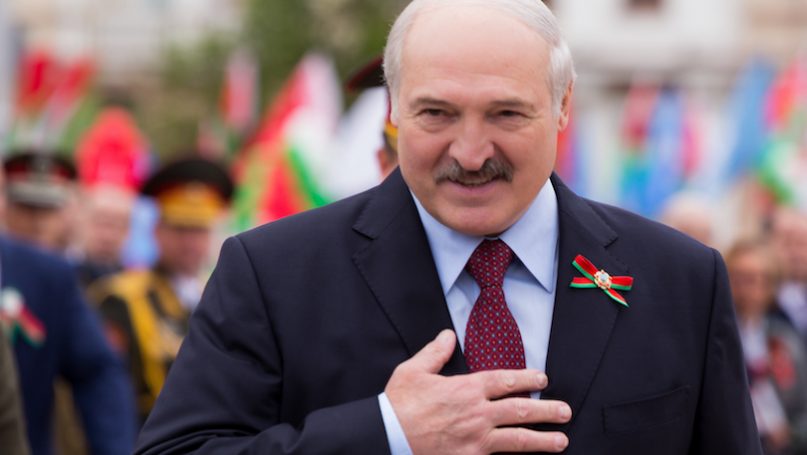
A flurry of communication over the past few days has taken place between the EU and the de facto leader of Belarus, Aliaksandr Lukashenka, led by the Acting Chancellor of Germany, Angela Merkel. The result has been a partial easing of the tense situation at the Belarusian-Polish border and the dismantling of migrant camps. It does not mean the crisis is over. Hundreds of migrants remain in the forests though some have been returned to Iraq while others have been moved to a warm building as a temporary shelter.
Several countries, led by Poland, as well as the Belarusian opposition have objected to the communication with Lukashenka in the belief that it breaks an agree EU policy of sanctions and isolation of a leader who has responded viciously to the protests against the disputed results of the 2020 presidential elections, interned over 7,000 political prisoners, beaten and tortured dozens, and hijacked a Ryanair flight from Athens to Vilnius last May to arrest Raman Pratasevich, one of the coordinators of the election protests through his Telegram NEXTA channel on social media.
In fomenting the crisis Lukashenka clearly anticipated that he would get a response from the EU. His goal is not so much ending the migrant issue or recognition of his continuing presidency, but the removal of sanctions and renewed dialogue. Over past months, he has been limited to communication with, and increasing reliance on, his one remaining ally, Vladimir Putin’s Russia, with the result that he is now fully dependent on Moscow for his survival and that of his Security Council. Lukashenka’s role has diminished from one of a reluctant and demanding ally to a junior partner that offers slavish praise for a powerful boss. The balance of power in short has moved to Moscow.
Since 2017, Lukashenka’s position has evolved from a subtle politician adopting a carefully balanced path between Russia and the EU–with links also to China and the Middle East–that has allowed him to manoeuvre between them to a political leader that has lost his way. In this same period, his policies have become flawed and desperate, beginning with his lack of response to the Covid-19 virus, which is still at a critical phase in the country, and continuing with fabricated assassination plots and inventing a Hamas threat to an international flight to hijack an airliner. The sustained crackdown has elicited new sanctions imposed by the EU, the UK, United States, and Canada, none of which recognizes his as president.
Also factored into the equation is his Lukashenka’s electoral opponent, the neophyte politician Sviatlana Tsikhanouskaia, who has remained active outside Belarus, visiting various Western capitals in a sustained campaign to keep them aware of the political crisis and opposition to Lukashenka’s continuing rule. Lukashenka has managed to quash all attempts to remove him within the country, but is helpless to stop what is happening beyond its borders. Tsikhanouskaia has been well received from Washington, DC to Warsaw, and her intelligent and sincere speeches have evoked positive responses.
In response, the latest resort of Lukashenka has been to manufacture a new crisis by reversing his much-touted policy of protecting Europe from migrants and the dispersal of drugs, and encouraging would-be refugees (Kurds, Iraqis, Syrians, and others) to fly to Belarus before transporting them to the border, and sometimes providing them with wire cutters and even weapons to penetrate the Polish border guards.
Poland’s response was predictably firm and played into Lukashenka’s hands as Belarusian TV could display images of armed units firing water cannons or tear gas into crowds that included high numbers of women and children. The images might as well have flashed the slogan “this is Europe” over the screen. Poland by tradition has accepted very few refugees from the conflicts in the Middle East, Africa, or Afghanistan. In fact, most migrants are attempting to reach Germany rather than Poland.
Merkel’s intervention therefore deserves more than knee-jerk condemnation. It was necessary for prompt action, which likely would have been impossible had she discussed her plans with Poland and other EU members beforehand. The immediate humanitarian crisis has been averted. And there is no suggestion either in Minsk or in Germany that the two phone calls (15 and 17 November) implied the recognition of Lukashenka’s legitimacy. Rather, Germany was dealing with the only person–other than his Cabinet–who could conceivably change the situation.
What is key, however, is that communication should not presage the commencement of a longer-term strategy of renewed engagement or dialogue with the regime in Minsk in its current form. Merkel also talks regularly with Putin. Relations between the two countries are closer than those between the EU eastern borderland countries and Moscow. Resolution of a problem created by the regime in Minsk is unlikely to be determined without Russia’s assent, and thus it is beneficial to have open two windows of communication, namely between Berlin and Moscow, and Berlin and Minsk, as long as it does not negate the unity and decision-making power of the EU.
Those who have condemned Merkel’s initiative also need to consider one question: how can the wider political crisis in Belarus be alleviated? Since the protests on the street could not continue, there is no obvious answer from within the country. The Russian-backed regime may continue indefinitely, with or without sanctions, as long as it uses force and repressions as a deterrent to regime change and resists Russia’s plans for closer integration. Even at their height, the mass protests never resorted to violence, thus regime change was unlikely unless the army or security forces turned on Lukashenka. They proved too closely linked to the regime to take such a fateful step.
If change is to come, it requires interventions from external sources, the most likely of which is Russia, however unlikely that may appear at present.